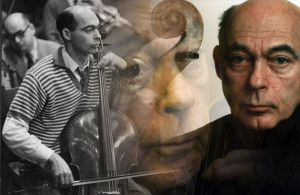János Starker Remembrance Week: A Tribute To János Starker
Guest Blogger
By Maria Kliegel
A moment of tense, expectant silence – to me it seemed to be an eternity. A couple of silent smoky clouds floating in the teaching room. Janos Starker looked at me in his typical manner, a gaze so full of intensity that I could feel it under my skin, followed by a shattering comment, uttered with a cool slowness and a stony, unchangeable look on his face: “if you ever play as inaccurately as you just did, I will deny ever having been your teacher.“ And again, an eternal moment of silence, this time I sat horrified in my chair, not being able to breathe or move. Silent smoky clouds.
One of my lessons in Bloomington ended this way – the Haydn D major concerto.
I was 19 and more than eager to learn from Janos Starker, whom I adored and respected endlessly, and of course I was full of pride and happiness to be part of a group of chosen students. It is easy to imagine with how much force his words struck me.
Of course he knew that and used his brilliant pedagogical skills in order to safely put me on the road, not to hurt me or cut me down.
Janos Starker was an extremely intelligent teacher who not only passed on excellent cello technique, but also had an extraordinarily caring way of guiding young people, including all psychological means and tricks. His aims were extremely high and almost impossible to reach. There always was struggle, but at the same time satisfaction as well from trying to reach the top and please the master. He set me on fire, burning with inspiration to reach his goals, to fulfill his demands.
This came to be one of my golden rules of life: “ If you want to become a musician who is characterized by individuality and true expressiveness, you have to train yourself, your muscles, your brain, your imagination, your ears, your taste on the highest level and in all dimensions of self-criticism and experience, so to eventually let your soul shine through. Music exists to touch and deeply move, not simply to show off or try to be everybody’s darling. Don’t get lost in being an actor on stage, showing how exciting and fantastic you are; create excitement for the audience but stay behind modestly with a cool and controlled mind.”
Janos Starker was an elegant human being and musician, full of honesty, dignity, responsibility, famous for his unforgettably subtle humor, loving, caring, guiding, demanding. His purity of tone and phrasing overwhelmed. He taught me love and respect for mankind and music. He woke up my senses, planted seeds for my entire life. He helped me organize and discipline myself, taught me to analyze and enjoy, to find my own frame looking for solutions and making decisions.
I feel endlessly privileged to have received the most precious of gifts – to know him, to have crossed his path, learned from him. Logically, it is now my turn and responsibility to carry his unique heritage to the next generation.
|
Maria Kliegel Born into a Polish émigré family of professional musicians, Maria Kliegel was given a cello at the age of ten, her father intending to form a string quartet within the family. After winning first prize twice in the German Jugend Musiziert (Young Musician) competition she went to the Frankfurt Conservatory and then to Canada for masterclasses with János Starker. Starker took her as a pupil at Bloomington, bringing discipline and technique to her otherwise instinctive musicianship. Intensive artistic instruction then came from Rostropovich’s month-long classes in Basle: he spent two weeks guiding students through concertos with the piano before allowing them to perform with an orchestra. Kliegel’s subsequent success at the Rostropovich Competition in Paris led immediately to an international profile, which she has maintained despite a sabbatical period to raise a family. Recording highlights include her Dvořák and Elgar Concertos and Schnittke’s Cello Concerto No. 1, described by the composer as ‘definitive’. In cello pedagogy Kliegel’s activities include a professorship at the Cologne Musikhochschule and a multi-media publication, Cello Master Class Using Technique and Imagination to Achieve Artistic Expression (originally in German). Kliegel’s playing is characterised by a warmth and sensitivity which complements established works of the eighteenth and nineteenth centuries as well as core twentieth-century works. Her playing is notably refined and beautiful, with a fastidious approach and (often the case with more recent players) the ability to adapt a mainstream style to suit a variety of repertory. The Bach Cello Suites (2003) are given an uncontroversial reading, Kliegel displaying accomplishment and careful consideration. There is clarity and resonance to her playing, relying upon fundamental tone production rather than too much glossy and historically anachronistic vibrato. A similarly thoughtful approach characterises Haydn’s Cello Concerto No. 2 with the Cologne Chamber Orchestra (2000): there is a lightness and elegance to the sound that suits the established mid-twentieth-century understanding of classical style. More exciting is Beethoven’s Op. 102 No. 1 Sonata (2003), with an energetic mood in the opening Allegro vivace, for example, albeit with a slightly exaggerated approach to Beethoven’s famous accents. This said, there is a somewhat saccharine understanding of slower passages, but the performance is well balanced and delivered with a beautiful bel canto. Richer tones are explored in Brahms’s Op. 99 Sonata (1992), with a committed outlook in the first movement. This reading is perhaps marred by a stereotypical ‘Brahms sound’: that is to say, the twentieth-century misconception that such music necessitates thick textures, steady tempi and heavily-applied vibrato. Shostakovich’s Cello Concerto No. 1 (1995) is equally worthy. This is an attractive recording, though lacking the committed fire (and flaws!) of Rostropovich’s performances of this powerful work. In many ways Kliegel’s recordings are excellent, with evidence of an adaptable and sensitive aesthetic within an apparent conformity to recent notions of good taste. © Naxos Rights International Ltd. — David Milsom (A–Z of String Players, Naxos 8.558081-84) |
Subjects: Artists


